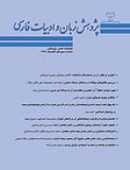بررسی تبادل معنا در کتابهاي درسی علوم انسانی: در چارچوب دستور نظاممند نقشگرای هلیدی از منظر فرانقش بینافردی* (رویکردی نقشگرا)
محورهای موضوعی : Research in Iranian classical literatureمریم اعلايی 1 * , فردوس آقاگلزاده 2 , محمد دبیرمقدم 3 , ارسلان گلفام 4
1 -
2 -
3 -
4 -
کلید واژه: کتابهای درسی علوم انسانی دستور نظاممند نقشگرای هلیدی فرانقش بینافردی وجه نهاد,
چکیده مقاله :
هلیدی در دستور نقشگرای نظاممند خود بر این باور است که هدف اصلی زبان انتقال معناست و به همین منظور گویشوران برای تبادل معنا متن را میسازند، یعنی در تعامل؛ تبادل اصوات، کلمات یا جملات مد نظر نیست بلکه آنچه اهمیت دارد رد و بدل کردن معنا است. هدف از تدوین این مقاله بررسی کتابهای درسی علوم انسانی سازمان سمت در چارچوب دستور نظاممند هلیدی و به طور خاص فرانقش بینا فردی است. روشی که در این تحقیق بهکار گرفته شد توصیفی- تحلیلی است. نتیجه بدست آمده بیانگر آن است که نویسنده با استفاده از جملات خبری در بسامد بسیار بالا صرفاً به ارائه اطلاعات پرداخته و این امر موجب میشود تعامل دو سویه رخ ندهد و نویسنده به هدف خود که همانا انتقال مفاهیم به طرف مقابل است نرسد.
In his systemic-functional grammar, Halliday believes that language is primarily aimed at conveying meaning; so speakers form the text in order to communicate what they mean. This implies that in interaction, exchanging of sounds, words or sentences is not intended; what matters is the exchange of meaning. The present article investigates the humanities textbooks published by SAMT within the framework of Halliday’s functional grammar, particularly. The method adopted here is descriptive–analytic. The result obtained from the interpersonal perspective suggests that writers, making frequent use of positive predicative sentences, merely present and bombard information in the form of monologues; the relationship between the reader and the writer consequently breaks off, and writers fails to achieve their end, to wit, communicating concepts to the reader, and reach a dead-end point.

